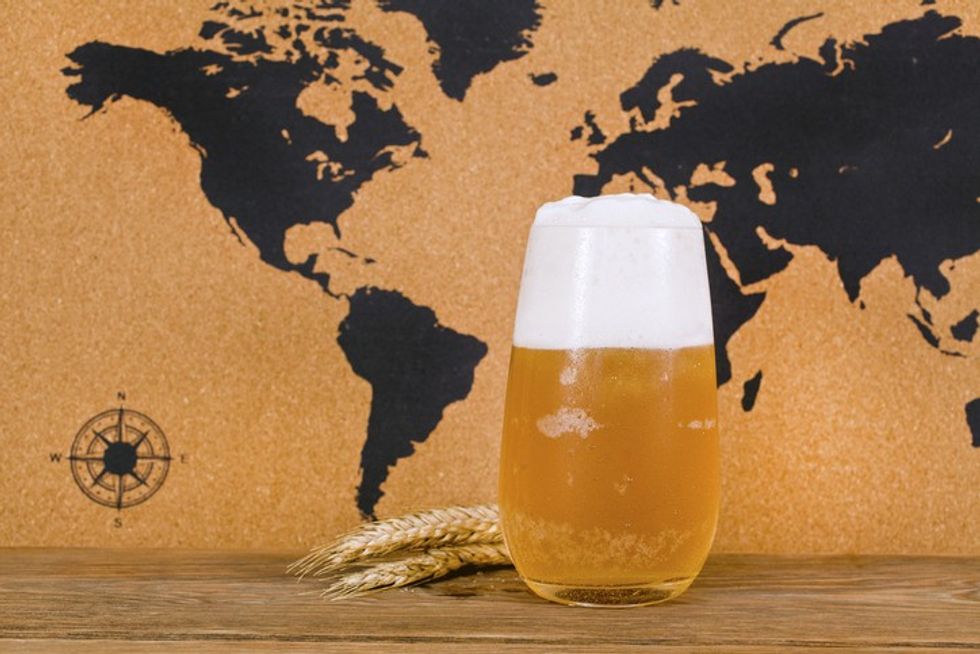Convenience stores have been a mainstay of our streets for years. As many shoppers relied on their local corner shops or stores for their groceries, last two years’ ups and downs have brought a renewed sense of support and camaraderie for local shops and businesses. Now that we’re back into the normal swing, it becomes even more crucial for the local businesses to maintain their customer base and keep them enticed.
Jennie Inch, Brand Manager- Highland Spring Group, wants independent store owners to ensure they’ve got a competitive offering and holding onto their newly-acquired as well as old customer base.
“Developing a solid offering, incorporating tried and tested products that we know consumers love, along with new and exciting products, is key,” Inch said.
Mondelēz International’s mission for 2023 and beyond is to deliver the right snack for the right moment made in the right way.
“We want to help retailers make the most of the growing snacking opportunity and be a supportive, sustainable supplier to the convenience channel,” Susan Nash, Trade Communications Manager at Mondelēz International, told Asian Trader.
With ongoing cost-of-living crisis, prices and budgeting will rule the shoppers’ minds in 2023.Brits are expected to contemplate and research before making buying decisions.
Kevin Fawell, Off-Trade Sales Director at Molson Coors Beverage Company, too resonates that cost pressures will have a significant impact on buying habits, but consumers aren’t necessarily looking for ‘cheaper’ brands.
“People expect quality when they are enjoying occasions, whether that is from a mainstream choice or something more premium,” Fawell says, adding that Carling and Coors continue to be shoppers’ chosen ones while those looking for something more premium are likely to turn to popular World Beer options like Staropramen.
Sandra Brunet, Marketing Director, Campari Group UK, too forecasts that inflation will affect buying decisions.
“We are seeing consumer confidence falling at an accelerated rate, with the rising cost of living the number one concern for 46 per cent of Brits. In the year ahead, these trends are likely to deepen, meaning the Off Trade must be ready to support evolving consumer priorities and shopping habits,” she says.
Trends to expect
Retailers should keep their fingers on the pulse to ensure they’re offering customers what they’re looking for and matching their stock to what’s performing well.
And talking about trends, big nights-in are expected to get bigger in 2023.
As more people look to save money by enjoying a drink at home, independent stores can be the perfect place for hosts to stock up ahead of an event, or for guests to grab something on their way to someone else’s house, says Fawell.
Brands Carling and Coors are popular big night-in options. Many consumers are willing to pay extra for quality choices when they're drinking at home, so retailers’ ranges should also include options like Aspall Cyder, Staropramen and Cobra.
Premiumisation has been a constant trend when it comes to alcohol. This trend underlines the opportunity for independents by presenting a high-end range of alcohol options for consumers. Well-known and well-loved premium products such as Aperol are ideal, allowing retailers to suggest customers premiumise their Prosecco experience and tap into the at-home cocktails trend, without needing to invest in more costly spirits, Brunet says.

Gravitation towards premium drinks is here to stay despite the tightening purse strings.
Sunny Mirpuri, Director for Wholesale & Convenience at Budweiser Brewing Group, believes that customers will continue to spend on premium and super premium beer options especially during key, celebratory moments, such as major sporting events.
Another trend expected to continue in 2023 is food and beer going hand in hand in purchasing decisions.
“One out of two beers are now consumed with food, and mealtimes account for 38 per cent signaling that food and beer pairings are a great way for independents to continue to maximise sales,” he says.
Retailers should stock beers alongside complimentary food items, like, Corona next to limes and Budweiser beside crisps and snacks, to offer a smooth, hassle-free shopping experience. A positive shopping journey will not only boost spend but will also increase the chances shoppers will come back again.
Rise of no-and-low alcohol beer category is also expected to accelerate in 2023. C-stores must not ignore the growing customer base who are looking to moderate their intake whilst still enjoying the great taste of beer.
“One in 10 beer drinkers now regularly opt for an alcohol-free alternative, a figure which has grown by 16 per cent year-on-year,” Mirpuri tells Asian Trader, warning that retailers who do not stock no-and-low alternatives are missing out on an increasingly important market segment.
Coca-Cola Europacific Partners (CCEP) is another industry leader that is forecasting the trend of big nights-in throughout 2023. Soft drinks will continue to play a big part here so it is important to focus on key soft drink segments, says Amy Burgess, Senior Trade Communications Manager at Coca-Cola Europacific Partners (CCEP).
The biggest soft drinks brands in GB continue to drive growth in grocery and convenience, led by Coca-Coca Zero Sugar and Fanta. Mixers like Schweppes and adult soft drinks like Appletiser also have a role to play, providing a sparkling alternative to alcohol during mealtime or party occasions, Burgess says.
Healthier choices have been a priority for consumers for some time, Burgess points out, adding that as a result of reformulation, 86 per cent all CCEP soft drink brand ranges are non-HFSS, including Coca-Cola Zero Sugar, Fanta, Monster Ultra and Costa Coffee RTD.
As such, retailers should look to broaden their offers to include varied options as energy drinks and RTD coffee in particular are becoming more popular as consumers look for drinks to provide a pick me up.
Sustainability is now a key consideration for consumers and CCEP is a torchbearer here too. In partnership with Coca-Cola GB, CCEP is the first major soft drinks provider in GB to introduce attached caps to 1.5L and 500ml plastic bottle that stay connected to the bottle after it’s opened, which will help improve recycling rates.
Consumers indeed have become increasingly aware of their environmental footprints. Highland Spring understands the importance of education within sustainability and recycling, Inch told Asian Trader.
Each of Highland Spring’s bottles can be recycled. The maker is currently on a journey to reach 100 per cent recycled content (excluding cap and label) across its entire bottle range by 2025.

Highland Spring’s flavoured sparkling cans are made with aluminum, and are readily recyclable to be back on the shelf within 60 days. Each and every Highland Spring product has recycling messaging printed on-pack, and retailers should ensure they take note to further encourage customers to dispose of responsibly.
In the world of confectionery, on-trend and relevant new flavourswill be a key growth driver, attracting incremental younger adult consumers. Whether it’s salted or caramelised white, caramel is the number one best-selling chocolate flavour with salted caramel being a top five NPD flavour in chocolate.
Earlier this year, Mondelez brought the delicious caramel taste to Cadbury Twirl which has been met with great excitement by consumers.Cadbury Caramilk was a smash-hit with shoppers when it launched last year. It now has been expanded to offer shoppers the beautifully crafted golden caramel chocolate in Buttons format - perfect for sharing occasions with friends and family.
There is also an increasing consumer appetite for plant-based alternatives. Last year, Mondelēz International launched Cadbury Plant Bar- a new plant-based alternative to the nation’s favourite chocolate bar after intensive research of over two years at Mondelēz International’s Research and Development centre in Bournville.
In sugar confectionery, Maynards Bassetts’ Fizzy Fish and new Sour Patch Kids Watermelon have been certified vegan by the Vegan Society, allowing retailers to cater to this growing consumer appetite and offer their shoppers even more choices.
Consumers are now returning to on-the-go day routines, with those out and about using public transport once a week or more. Retailers can cater to the firm return of the on-the-go occasion with quick and convenient snacks from Mondelēz International, such as Cadbury Brunch Bars, belVita Soft Bakes, Philadelphia Handi Snacks, Dairylea Filled Crackers, and Cadbury Twirl and Wispa single bars.
Following the pandemic, seven in 10 adults said that they wanted to make healthier choices. Mondelez’s new delicious new non-HFSS range can cater well to this demand.
New Launches
Studying these trends with a keen eye, food and drink makers keep innovating and coming up with new products.
Following the success of Ribena Sparkling, Ribena has launched new Ribena Sparkling Zero Sugar featuring the refreshing taste of a carbonated soft drink in iconic blackcurrant flavouravailable in 500ml and 2L bottles. Ribena Sparkling Zero Sugar also has a new refreshed look with the updated fresh and modern pack design making it an exciting, new must-stock product for retailers.
“The updated fresh and modern pack design across the whole range, including Ribena Sparkling Zero Sugar, will help the drinks to stand out on shelf to encourage trial and drive additional purchases,” Matt Gouldsmith, Channel Director, Wholesale, Suntory Beverage & Food GB&I, tells Asian Trader.
Ribena Sparkling range is also exempt from HFSS restrictions – just like Suntory Beverage & Food GB&I’s other favourite soft drink brands.
This year, Highland Spring will be focused on its plain sparkling water with a wellness campaign, which saw the collaboration of Highland Spring, Love is My Protest and Katie Smith Illustrations to create the ‘Uplift Your Everyday’ Journal.
In February this year, Budweiser will launch super-premium lager, Stella Artois Unfiltered. The unfiltered lager category, highly popular across Europe, is currently an untapped segment in the UK market and brings a differentiated, flavourful addition to the world lager category.

Seeing the rising popularity of world beer, Molson Coor recently launched European-style lager MadríExcepcional that has a crisp, refreshing taste and distinctive branding.
Continental-style drinks such as Staropramen are becoming increasingly popular too, providing a more crisp and hoppy flavour than the styles we traditionally drink in the UK, says Fawell, adding that Staropramen’s malty taste profile provides a point of difference that really appeals to consumers.
Mondelez recently launched limited-edition Toblerone Golden which has the iconic crunchy nougat of a classic Toblerone in the delicious golden caramel chocolate, a perfect option for seasonal gift, helping retailers to drive premium sales and trade-up with a remarkable and distinctive limited-edition offer.
Ring in the new
Stocking enough will be inconsequential if a store does not attract and intrigue customers. When it comes to impulse purchase, display and merchandising is the key.
Soft drinks are a popular part of ‘meal deal’ offers, so placing them alongside complimentary categories like snacks or sandwiches can help to ensure linked purchases, Burgess from CCEP tells Asian Trader.
Highlighting the recyclability of products with in-store displays and on social media can help retailers to emphasise the contribution they’re making to the green future of their communities, Burgess says.
Fawell from Molson Coors too believe in placing apt food around beverages to inspire ideas and drive sales.
“Cobra – with its distinctive character and smoothness that is perfect alongside a curry –can be used as part of a meal deal for the perfect at-home curry night, alongside traditional sundries like poppadoms, onion bhajis and samosas,” he says.
Premium options like MadríExcepcional, Staropramen and Aspall Cyder also lend themselves to food pairings. Madrí Exceptional crisp andStaropramen’sflavour profile make it perfect for enjoying alongside meat dishes, while Aspall is a perfect accompaniment to lighter dishes such as fish and salads.
Multipack formats have been a key focus over the last year and will continue to do so next year as well.
“Chilled small multipacks – ranging from four-packs to ten-packs of cans or bottles – account for 72.8 per cent of impulse lager sales, with ten-packs in particular seeing the strongest growth in the last year as more people enjoyed more at-home occasions,” says Fawell.
To tap into this growing demand, Molson Coor has recently launched a Doom Bar ‘fridge pack’ containing 10x440ml cans, and a 6x330ml can multipack for Staropramen range to help retailers drive sales. Both packs are encased in a recyclable cardboard sleeve, making them entirely plastic free, he says.

Brunet from Campari Group advises retailers to prepare ahead for a busier period and look at ways to inspire shoppers in store as prices rise and more Brits switch from on-trade to off-trade.
Retailers should also look to stock products that are versatile enough to meet the needs of different at-home occasions. Like, Aperol is a sophisticated aperitivo that is the ideal accompaniment to any meal but is also perfectly suited as a shareable serve for a larger group gathering.
Retailers should also encourage their customers to participate in the popular trend of cocktails at-home.
“With this trend remaining strong as we go into 2023, retailers should look to champion the brands at the heart of easy-to-create cocktails such as Wray & Nephew in the Wray Rum Punch and Aperol in the Aperol Spritz,” says Brunet, adding that a simple cocktail and a great shareable serve is the Wray Rum Punch.
When positioned alongside pineapple and pomegranate juices, retailers can encourage shoppers to add Wray & Nephew to their basket to try a fruity and delicious rum punch cocktail.
To keep independent retailers one step ahead in 2023, industry leaders have gone digital.
Suntory Beverage & Food has recently launched Simply Soft Drinks, a digital portal that retailers can use to plan their range carefully. Additionally, there’s a section which has tailored advice around the latest industry updates as well as info about legislative changes.
This year Budweiser also launched B2B e-commerce platform BEES that provides customers with seamless order experience, communication and better business performance. The platform accelerates the digital journey for retailers, allowing business owners to browse for products, place orders, earn rewards, arrange deliveries, manage invoices, and access business insights all in one place.
Suntoryand Budweiser will be joined by Mars Wrigley which is also introducing a valuable online tool designed specifically for independent retailers in the form of Availability into Action website.
“The Availability into Action website is an educational tool that offers a great opportunity for us to share insight and advice with our independent retail partners so they can achieve the best results possible,” Dale Cuthbert, Head of Impulse Category at Mars Wrigley, told Asian Trader.
The site also offers tips for retailers on how to create best-in-class displays for gums, a product whose sale largely depend on its visibility and point of purchase displays.
New Hope
While it seems all dark and hazy with prices and bills rising exponentially, the crisis comes with a silver lining for the local stores as more and more Britons are expected to opt to stay, eat and drink at home.
With 38 per cent of consumers already becoming more observant of pricing and sticking to an allocated budget, retailers should look to offer products at a wide range of price points, says Brunet from Campari Group.
To win in 2023, offering a ‘cocktails at-home’ bundle should be a prime consideration. A bundle would hit a set price point to encourage consumers to focus on this increasingly popular activity, whilst championing best-selling line, Brunet says.
What we’ve seen during previous times of economic uncertainty and is expected to be seen again is the “lipstick effect”, whereby consumers continue to spend money on smaller indulgences while cutting down on bigger expenditures.
Spending a little more on a premium drink could be one of the small indulgences that people are willing to treat themselves with, says Fawell, who is expecting more premium beer and cider lines like Aspall Cyder, Staropramen and MadríExcepcional to remain popular choices.
As Brits get ready to face 2023, it is time for store owners to buckle up, take a stock of what’s new and what’s needed so that shoppers keep coming back.
As we start a fresh calendar, it is time to make convenience channel rise and shine. Take a leap of faith and let’s begin this wondrous 2023.


